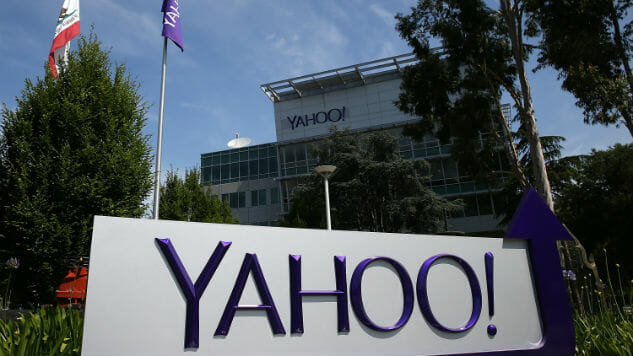Buyers Are Approaching Yahoo. Where Did It All Go Wrong for the Internet Giant?
Image courtesy of Justin Sullivan via Getty Images
Yahoo is in the midst of courting acquisition offers in the hopes of saving the once-triumphant tech giant from slipping into obscurity.
UK newspaper The Daily Mail, with its own sprawling online presence, is the latest suitor but it is far from being the first company to make an offer for Marissa Mayer’s struggling empire despite its well-documented troubles. So how exactly did a company that was once a darling in Silicon Valley find itself in this unenviable position of selling itself off?
In January 2000, Yahoo was a mainstay of the internet. Its share price was trading at an all-time high of $118.75 per share. Six years since its launch, the company founded by Jerry Yang and David Filo in Stanford University was riding a wave of momentum that placed it front and center of the dot-com bubble and the blossoming internet generation.
The duo set up the company in 1994 as a directory of websites with the not-so-catchy name of Jerry and David’s Guide to the World Wide Web. Eventually renamed Yahoo! (acronym for Yet Another Hierarchical Officious Oracle), it would reach one million hits by December that year and in March 1995 was officially incorporated. And the wins kept coming.
It filed its IPO in 1996 and launched Yahoo UK that same year. Next came the acquisitions. It scooped up Four11 in 1997 and turned its email platform Rocketmail into Yahoo! Mail. ClassicGames.com was bought and rebranded Yahoo! Games. And in 1999, it acquired web host GeoCities.
In June 2000, the company signed a deal with Google, which would allow Google’s search directory to partly power Yahoo’s. It seemed like Yahoo could do no wrong. But little did it know that what goes up must come down.
The now-infamous dot-com bubble finally burst in 2000, sending Silicon Valley into a tailspin and start-ups that were considered tech sweethearts in the late ‘90s shut their doors. Yahoo survived but not without bruises and scars.
In 2001, CEO Tim Koogle stepped down. He had served since 1995 and little did he know at the time that he would become probably Yahoo’s most stable CEO in its history.
He was replaced by Terry Semel, who was perhaps unknowingly facing a storm of adversity ahead.
By September 2001, Yahoo’s stocks were trading at an all-time low of $8.11, a stark contrast to dizzying highs just two years prior.

-

-

-

-

-

-

-

-

-

-

-

-

-

-

-

-

-

-

-

-

-

-

-

-

-

-

-

-

-

-

-

-

-

-

-

-

-

-

-

-









































